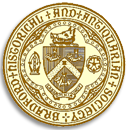Book Review
(First published in 1985 in volume 1, pp. 78-79, of the third series of The Bradford Antiquary, the journal of the Bradford Historical and Antiquarian Society.)
The Great Paternalist: Titus Salt
Jack Reynolds. Maurice Temple Smith, 1983, £16.
In spite of the significant part played by Titus Salt in the most important period of Bradford's industrial history, comparatively little is known about either his private or his business life.
In 1877, within months of the great man's death, Robert Balgarnie, minister of South Cliff Church, Scarborough, - one of Salt's benefactions produced a typically effusive Victorian biography - Sir Titus Salt - his life and its lessons1. The very nature of Balgarnie's work made it almost essential for someone, someday, to 'get behind the scenes' and paint a truer picture. Jack Reynolds, born in Bradford, a teacher of history at every level from municipal grammar school to post-graduate research, and a former editor of the Bradford Antiquary, seemed almost destined to be the man to set the record straight. It was not a case of 'long choosing and beginning late', because Mr Reynolds, through his long connection with local studies and his particular interest in Salt and Saltaire, a subject on which he often wrote and lectured, came ready armed for the job. He has said all that can be said about a man whose actions always spoke louder than his words.
Besides writing a definitive biography of Titus Salt, Jack Reynolds has given us a very full account of the transformation of nineteenth-century Bradford, which 'from a relatively simple, semi-rural world, somewhat detached from the mainstream of economic and political life, was becoming a completely organised industrial society, the' international centre of the worsted textile industry'. This change took place between 1834 and 1873, a period which almost exactly spans Salt's career. During this time four great Bradford innovators, Lister, Holden, Ripley and Salt stood out as men of true genius. The author gives full accounts of the work of the first three, but naturally accords pride of place to Titus Salt. He describes Salt's career from his birth in Morley in 1803 to his arrival in Bradford at the age of nineteen, where he joined his father in the firm of Daniel Salt & Son, woolstaplers. By 1850 Titus had carried out successful experiments with alpaca, held office as mayor, and was certainly the richest man in Bradford. He had intended to retire at fifty, but said 'he wanted something for his boys to do'. Perhaps he knew that he would never fit easily into the world of the landed gentry as Lister had done when he became Baron Masham of Swinton, and hoped instead to create an industrial dynasty.
The author is careful to point out that one of the motivating principles in the creation of Saltaire was the hope that by providing better working and living conditions for his employees Salt would check the kind of political unrest shown in the Chartist riots, which were at their height only five years before the opening of the new mill in 1853. He also punctures a number of myths about Saltaire, such as the tradition that Salt provided wash-houses because he hated the sight of clothes lines across the street (and indeed cut them down when he saw them). In fact many people complained about the clothes lines, because they were a nuisance to traffic and offended Victorian ideas of modesty, when 'ladies' unmentionables' were seen to be hanging across the streets. The popular notion that Saltaire was a completely 'dry' village is also questioned. Certainly Salt, who was a modest drinker, would not allow a single public house to be built, but there had always been an off-licence shop in the village, and the local chemist sold liquor. Salt upheld his principles, but it is unlikely that men dying of thirst would be greatly averse to walking a few hundred yards to one of the many pubs in Shipley in order to get a drink.
Left-wing critics claimed that Salt had trapped a labour force with promises of good wages and better all-round conditions and then kept wages at a level which resulted in two strikes. In spite of all this, there is no doubt at all that Saltaire was an industrious, respectable and energetic community. Proof of Salt's popular esteem was shown at his funeral on 5 January 1877, when thousands of spectators watched the remarkable procession on its way from Bradford to his own Congregational Church at Saltaire. A prince could not have wished for more.
Titus Salt may have failed to establish the industrial dynasty which was his aim, but Saltaire survives as a close-knit community with what is becoming rare now in Bradford - a busy mill. Thanks largely to the conservation order placed upon it Saltaire is still a most attractive place, drawing more and more sightseers and tourists. For those who care to look beneath the surface this book will be the means of conserving the memory of 'the most outstanding man of Bradford of his own or perhaps any period'.
Reference
1. R. Balgarnie, Sir Titus Salt, Baronet, 1877. (Reprinted 1970, by Brenton, Settle, with an introduction by D.B. Ogden.) (back)
See also:
J. Reynolds, Saltaire, 1976 (Bradford Art Galleries & Museums).
Titus of Salts, 1976 (Watmoughs, Bradford).
M.W.B.
© 1985, M.W.B. and The Bradford Antiquary
